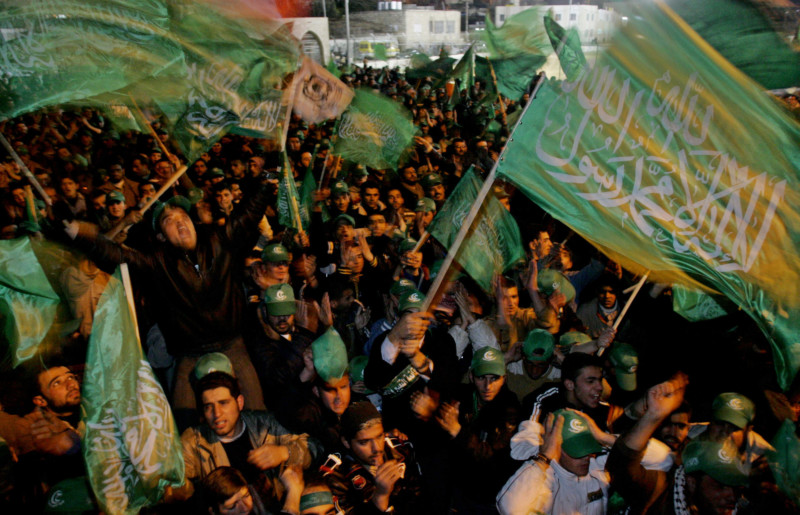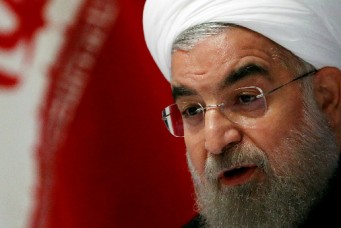From Political Islam to the Politics of Islam
With electoral paths blocked or unpromising, the Islamist project is now being transformed from what it was at the beginning of the last decade

Palestinian supporters of Hamas celebrate the election results during a rally in the West Bank city of Hebron, Jan. 26, 2006. Stoyan Nenov/Reuters
The phrase “political Islam” can conjure an assortment of ideas, movements, institutions, and arrangements—anything in which Islamic beliefs, practices, teachings, or actors are pushed or pulled into the political arena. The politics of Islam includes many aspects to consider. And indeed such a diverse family of meanings is precisely what the term “political Islam” should be understood in 2022.
But this marks a change from a decade ago, when the term suggested something far more specific: an attempt by a certain group of social actors—labeled “Islamists”—to enter the realm of political contestation, especially through established (if often unstable and negotiated) electoral channels and rules. Seen from this latter perspective, the story of the past decade in the region can be described as the decline, even the defeat or disintegration, of the political Islamic project.
But seen from the perspective of the much wider variety of meanings, the politics of Islam continues to operate in a number of ways. In that sense, the politics of Islam is more of a transnational force today than it was a decade ago. It used to be the case that Islamists (and their opponents) were primarily focused on what happened within the borders of their own states. They looked abroad to be sure, for models, slogans, tactics, and trends. But today, more than imitation is at work at a transnational level: arms, funds, and alliances cross borders across the Middle East and North Africa.
Finally, while there are distinctive elements to the prominent role religion plays in regional politics, there is nothing exotic; the field of affairs that we refer to as “religion” is rarely hermetically sealed from politics wherever one travels in the world. Yet, political Islam’s particular manifestations in the Middle East have taken on distinctive forms in recent years.
The Defeat of Political Islam?
Over the previous two decades, Islamist movements in many countries in the region had invested unevenly, but increasingly, in electoral politics. None gained political authority as the result of an election (nor were elections sufficiently competitive to allow such an outcome) except in Palestine. And the results of Hamas’s triumph in the 2006 Palestinian parliamentary elections were sufficiently destabilizing that most Islamist parties more fully embraced the “participation, not domination” formula they had developed. In Jordan, Morocco, Kuwait, Algeria, and Yemen, Islamist movements fashioned party-like organizations as one way to pursue their mission of increasing the role of Islam in public life.
In 2012, Islamists seeking authority through the electoral process seemed to be one of the most powerful trends operating in many countries in the region. This rise was not sudden except in its post-uprising phase, when it offered the potential for Islamist parties to actually govern. This reversed the previous adage of “participation, not domination” that Islamist movements had long used to assure rivals and regimes that they simply wanted a seat at the table, but not to establish theocratic orders.
Yet the uprisings that swept the Arab World in 2011 appeared to open new possibilities—and they briefly did. Tunisia’s Ennahda emerged from illegality into becoming the country’s largest parliamentary party; Morocco’s Party of Justice and Development (PJD) headed a cabinet; Islamists were active in Syria, Yemen, and Libya as well. Most notably, Egypt’s Muslim Brotherhood took the step it had always balked at—forming a political party—and won a parliamentary plurality and then the presidency.
It was this last achievement that saw the most radical and sudden reversal: the history of the Muslim Brotherhood’s role in Egyptian governance in 2012 and 2013 is too fraught and controversial terrain to rehearse here, and the rapidity and totality of its fall were not repeated elsewhere. But in the years after, its sister parties in the region suffered setbacks: Jordan’s Muslim Brotherhood experienced fissures and lost its legal status and Kuwait’s Islamic Constitutional Movement opted out of Kuwaiti elections for two cycles.
At the same time, other countries saw more subtle shifts that suggested electoral politics was limited in what it would ever achieve. Palestine’s Hamas remains bottled up in Gaza to this day (where it has ruled, internally uncontested, since a brief Palestinian civil war in 2007). Yemen’s Al-Islah found its ability to run parliamentary campaigns moot as the country descended into bitter armed conflict, and the Iraqi Islamic Party similarly found that its limited ability to field candidates in Arab Sunni regions hardly seemed relevant in the tumultuous and sectarian environment of post-Baathist Iraq. Syria’s uprising degenerated into a civil war in which armed and radical actors edged others out of the way.
And even in North Africa, results were disappointing. What seemed to be a process of compromise eventually gave way not to respectability, but to Islamists being sidelined in 2021. A decade after the hopeful events of 2011, even Morocco’s PJD found itself tossed out by election results. Tunisia’s Ennahda found that the electoral path first led to gridlock and then seemed on the verge of collapse when the president’s autogolpe of July 2021 moved totally outside the constitutional order.
Some of these events were unrelated; others were loosely linked by a powerful regional coalition that had risen against the project of Islamization through the ballot box. But the overall regional trend was clear. A pious and ambitious young Muslim in 2011 might have cultivated electoral skills; in 2021, such a path would have seemed irrelevant almost everywhere in the Arab World. Political Islam in that sense had either been defeated, sidelined, or forced into hibernation.
The Continuing Politics of Islam
However, Islam has hardly exited the political realm. While Islamist party and electoral politics experienced a general regional collapse, there is still political contestation about the role of Islam in public life. This contestation does not take the form of electoral competition, but has moved into different realms, some of them sharply defined and others amorphous, but none of them irrelevant to the politics of the region.
First, certain groups that had shown some inclination to follow the path of political Islam—particularly Salafist movements that had forayed into electoral politics, most notably in Egypt and Kuwait—have largely reversed course. They have not disappeared, however, and their withdrawal is not a sign of erasure.
And that leads to a second trend that is now visible: the various categories of the politics of Islam have deepened their influence on one another across borders, often with cascading effects. For instance, the quashing of electoral options in some countries has made jihadist movements more credible in others; shifts in the religious establishments of some leading countries, such as Saudi Arabia and Egypt, had an impact on other areas where Islam and politics mix. In particular, the sharpening positions of the leaderships of the Saudi, Egyptian, and Emirati establishments against the Muslim Brotherhood may have deprived that movement of a zone where it could count on sympathetic pockets, if not support.
And third, those state religious institutions—some of the leaders of which have been regarded warily by Islamist political activists as too close to existing regimes—have shown themselves to have powerful voices in society. No state religious institution is a bastion of opposition to the regime heading the state apparatus, but some (most notably perhaps Egypt’s Al-Azhar) achieved significant autonomy in the aftermath of 2011; in Tunisia a more muted struggle has taken place over management of Al-Zaytouna, another Islamic university with international clout and influence. Ministries of religious affairs often monitor—or draft—sermons. Religion is a mandatory subject in the primary and secondary schools of most states of the region, making curricula another battleground between rival approaches to religion. Whether organizing teachers in Jordan, debating the desirability of government-mandated sermons in Egypt, or sidelining state university faculty deemed close to the Muslim Brotherhood in Saudi Arabia, state religious institutions are a frequent arena for contest among different orientations.
Fourth, personal status laws have sparked a series of debates in the region—over inheritance in Tunisia, divorce in Egypt and Palestine, and even over legislative drafting in Saudi Arabia. At first glance, the significance of these debates might seem exaggerated since they often generate more talk than fundamental change. But that is precisely the point: even in countries where politics is sharply constrained; where freedom of expression is limited; where mutual suspicions among various orientations (conservative, feminist, reformist, security-minded) run very deep, actual change in the law is difficult to navigate precisely because of the number of people deeply (and personally) affected and the number of political actors (within and outside the state) closely following any proposed change. Even in countries where political leaders can make their will into law without serious discussion—much less opposition—personal status law, with its sensitivity for religious groups, is resistant to fundamental change.
Fifth, jihadism is still a force in the region. In one sense, jihadism often presents itself as the antithesis of political Islam (in the narrow definition of that term): jihadists evince deep contempt for the idea of islamicizing society through the legal political process, through parliamentary committee meetings and door-todoor electoral canvassing, or through gradual reform. But if jihadism represents a radical alternative path, it does not seem to represent a viable one. It reached its zenith with the rapid spread of the Islamic State in the middle of the past decade and remains a force in various countries of the region. Countermeasures against this militancy have left a deep residue in harsh security regimes, so that even if jihadism has peaked as a force, its impact will be felt for some years.
Sixth, sectarianism has greatly increased as a political force in the region. It always played a role in some countries (most explicitly in Lebanon), but the most remarkable development in the past decade has been its rise on the level of regional politics. To be sure, “sectarianism” is an imprecise term—it is not doctrinal matters in and of themselves that dictate international alignments and cross-border interventions. But rivalries, arms flows, and political loyalties are far more connected with the sectarian identities of populations and leaders than at any time in recent centuries.
Finally, there may be quiet but portentous contests occurring under the radar, whose political significance may not become clear for years. In most countries in the region, there is a chasm among generations in terms of cultural orientations, sources of information, and modes of social interaction. The uprisings of 2011 are often understood as rebellions of the youth—but now an even younger generation is entering adult life. The religious revival that occurred in many countries a half-century ago did not initially appear all that political but had a profound political impact over the long term. If something similar is happening now, we may not know for a while. Anecdotal and impressionistic reports of declining religiosity in some circles, lessening deference to older authority figures, and disappointment with most prevailing ideologies suggest that similar changes may be afoot but have not yet emerged clearly enough to define or precisely describe.
The Global Normal
So is the region likely to be distinctive in the high and continuing relevance of religion to the political realm? If the narrowly conceived project of political Islam seems like yesterday’s news, is the politics of Islam likely to be a uniquely Middle Eastern story over the coming decade?
Sort of. There is nothing at all unusual about the relevance of religion for politics. Indeed, the relationship between religion and politics often evolves but it rarely disappears. What differs over time and place is less its significance than the form it takes. Political struggles over centuries in Spain focused on the position of the Church—its property, its place in national identity, and its role in the educational system. This struggle was not only long-lived; it was violent. The place of Buddhism in the Sri Lankan order, the relationship between Hinduism and the Indian state, the place of Islam in China, and arguments between traditionalists and social justice advocates in Catholicism are matters that have become more contentious in recent decades, not less. Thomas Jefferson famously called for a “wall of separation between Church and State” in the United States. But even in that country—seemingly one of the birthplaces of secularism—the authority of that phrase as well as its meaning in practice are subjects of sharp political debate to this day.
There is nothing exotic about religious politics. What is distinctive in the Middle East might be the specific set of structures (ministries of religious affairs and state muftis, for instance), and arenas for conflict (personal status laws, regulation of sermons) that are common in the region but often do not have precise analogs elsewhere. Those structures and arenas do not lie outside of politics; if anything, they have become more sharply contested over the past decade.
The political trajectories Arab societies have followed over the past ten years have hardly resolved any debate. The force of political Islam, narrowly conceived as an electoral project, has been blunted and dealt a series of very painful blows, but the coming decades are by no means headed down a path to separate the political from the religious.
Nathan Brown is a non-resident senior associate in the Middle East Program of the Carnegie Endowment for International Peace, and a professor of political science and international affairs at George Washington University. He is author most recently of Arguing Islam after the Revival of Arab Politics and co-author of Lumbering State, Restless Society: Egypt in the Modern Era.
Read More


